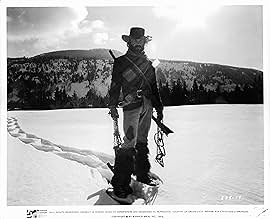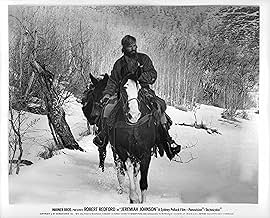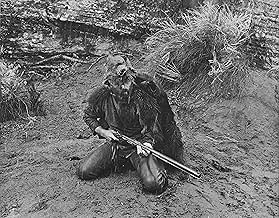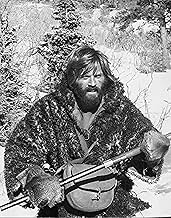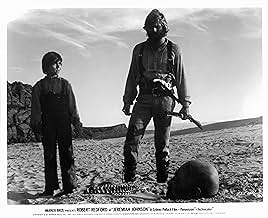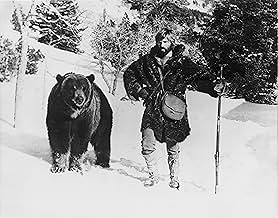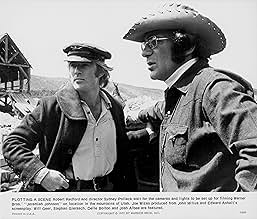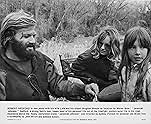Un montañero que quiere vivir como hermitaño pero se ve involucrado en una vendetta entre Indios.Un montañero que quiere vivir como hermitaño pero se ve involucrado en una vendetta entre Indios.Un montañero que quiere vivir como hermitaño pero se ve involucrado en una vendetta entre Indios.
- Dirección
- Guionistas
- Elenco
- Premios
- 1 premio ganado y 1 nominación en total
- Paints His Shirt Red
- (as Joaquin Martinez)
- Indian
- (sin créditos)
- Qualen's Daughter
- (sin créditos)
Opiniones destacadas
Hardened after the war with Mexico, and fed up with everyday life, American Jeremiah Johnson (Redford) leaves civilisation behind to live life as a mountain man. He intends to be self-sufficient as a trapper, but he finds that mother nature can be tough, and out here in the mountain wilderness he is not alone. There are others here, and Jeremiah must face many challenges if he is to truly survive.
Filmed entirely on location in the vast wilderness beauty of Utah, Jeremiah Johnson is light on plot but all the better for it. Film basically constitutes Redford's mountain man learning to survive up in them thar mountains, and, earning the right to do so. A number of issues will arise to test his metal, giving him a number of hardships and adventures to define his transformation from average Joe to a fully fledged mythical man of the Earth. Redford is wonderfully at ease in the title role, and very quickly he gets the audience on side to share in his journey. But ultimately it's the landscapes that you take away from this movie. Not only gorgeous, but also the critical character that frames Johnson during his isolation and battle for survival. 8/10
Robert Redford in the title role gets in on the last years of the mountain man experience. These guys trapped for the fur pelts living months and sometimes running into years before they came down to sell their goods. They lived alone among the Indians, hostile or not, and being that repeating rifles had not yet been invented the Indians had numerical and firepower advantage over them. They had to be one hardy breed of men as Redford and the others show.
Initially Redford lucks out winning the respect of the Indians when he avenges a crazy woman's massacre of her family. The Indians hold the insane in respect even though Redford kills several Indians doing it. They even give him an Indian bride in Delle Bolton.
His luck runs out when he reluctantly guides a party of soldiers through an Indian burial ground. After that they don't let up in trying to kill him and his loved ones.
Being the noted conservationist that he is I'm sure Robert Redford loved shooting in the national parks which are preserved as they were in the time of Kit Carson, Jim Bridger and the rest. Some beautiful cinematography is another hallmark of Jeremiah Johnson.
One of Robert Redford's best and most interesting characters he's brought to the big screen, this Jeremiah Johnson.
Thirty years on and after several viewings, I find this story grows on you, like the aging of fine wine in oak casks, such that another recent viewing gave me as much if not more pleasure. Precisely because it is not the standard `western' formula. One gets a little tired of John Wayne getting saddle-sore, killing indians and wooing women; at times watching `Jeremiah Johnson' I cannot help comparing a little with `Dances with Wolves' (qv), not because of any story similarity but more from certain situations being played out.
Robert Redford has given us numerous films in which his characterization is pretty good in general, but in this film I rather fancy he was inspired, even to the point of throwing off that silly category so beloved of those suffering Hollywooditis. Most notable in `The Sting' (qv), `All the President's Men', `Out of Africa', and `A River Runs Through it', without forgetting his excellent directing of `Ordinary People', one of the best true-life dramas I have seen.
`Jeremiah Johnson' is now one of the classics of the genre and even of cinema as a whole: always worth another viewing.
As Jeremiah Johnson (Robert Redford) wanders the mountains like a fugitive stricken by disaster, a solitary figure against awe-inspiring backdrops of massive rock formations, steep ravines and expansive mesas, you can tangibly feel the film, like the hero, transcending the specific time and place and breaching out vision to become an all-encompassing spiritual journey where the individual characters - fur trappers, bear hunters or Indians - are merely the unwitting parners in a dance of death.
Some viewers may be put off by the lack of straight-forward plot, the episodic, repetitive nature of the movie or the long stretches of silence, but it's from those exact things the movie takes its power. JJ comes unto its own in those small moments of quietude, in Johnson's silent encounters with indians, in the barren, unforgiving wastes of the craggy mountains that reflect so well the psychology of characters wandering in their shadow, in the subtle, heartwarming interactions Johnson has with the Indian woman he's taken for a wife and the mute boy he's taken for a son. There's hardly a word uttered between this peculiar family the entire movie but the ways they learn to overcome the barriers that separate them is a touching sight to behold.
There is some dated montage, a corny soundtrack; how much of this will affect your enjoyment will boil down to your affinity with how cinema was in the 70's. Still, what is left is this beautiful parable of broken humans learning to be whole again. Equal parts visceral, savage and heartwarming.
¿Sabías que…?
- TriviaBased upon a real-life trapper named John Johnston, nicknamed "Crow Killer" and "Liver Eater Johnston" for his penchant for cutting out and eating the livers of Crow Indians he had killed (several Crows had murdered his wife and he swore vengeance against the entire tribe).
- ErroresAfter burying her murdered family, Crazy Woman begins singing "Shall We Gather at the River" and Jeremiah joins in. This song was written by Robert Lowry in 1864 and first published in 1865, long after the time of the mountain men.
- Citas
Del Gue: I ain't never seen 'em, but my common sense tells me the Andes is foothills, and the Alps is for children to climb! Keep good care of your hair! These here is God's finest scupturings! And there ain't no laws for the brave ones! And there ain't no asylums for the crazy ones! And there ain't no churches, except for this right here! And there ain't no priests excepting the birds. By God, I are a mountain man, and I'll live 'til an arrow or a bullet finds me. And then I'll leave my bones on this great map of the magnificent...
- Versiones alternativasThe Warner Bros. Pictures logo is plastered with the Saul Bass variant in the 1982 VHS, 1992 variant in the DVD and 1998 VHS. The former print also has the closing Saul Bass variant plastering the line art WB shield.
- ConexionesEdited into La classe américaine (1993)
Selecciones populares
Detalles
- Fecha de lanzamiento
- País de origen
- Idiomas
- También se conoce como
- Jeremiah Johnson
- Locaciones de filmación
- Productoras
- Ver más créditos de la compañía en IMDbPro
Taquilla
- Presupuesto
- USD 3,100,000 (estimado)
- Tiempo de ejecución1 hora 48 minutos
- Color
- Relación de aspecto
- 2.35 : 1
Contribuir a esta página




